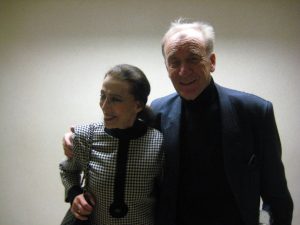
By Willem Jan Keizer
Rotterdam - Thanks to conductor Valeri Gergyev, we get more insight into the huge reservoir of Russian composers. Rodion Shchedrin for example. Last year a piano concerto of his was performed, Sunday night in de Doelen it was his opera for the concert stage 'The Enchanted Wanderer', after the book 'The Enchanted Wanderer' by Nikolai Leskov. The opera is dedicated to conductor Lorin Maazel, who also conducted the premiere in New York in 2002.
The only work with which Shchedrin achieved any fame in our country is his arrangement for string orchestra and five percussionists of Bizet's 'Carmen'. Because Shchedrin (born 1932) never bothered to join the Communist party, he had to wait until the fall of the Wall and the Iron Curtain in late 1989 to finally participate in international musical life. Since then, he has lived partly in Munich, partly in Moscow. He gained recognition for ballets and operas on now classic themes such as 'Anna Karenina' and 'The Dead Souls'.
Leskov calls Shchedrin 'the most Russian of all writers'. In 'The Enchanted Wanderer', that is quite true: the story seamlessly links deep religiosity to that Russian second nature, consuming endless amounts of vodka, with all its woes. With his story, Shchedrin tries to give shape to various dilemmas, from simple ones - whether or not to be the drinking man - to diabolical ones that deal with life and death. Above all, the composer lets the language and melody lines blend together. The orchestral accompaniment is entirely at the service of this. One moment it is Ivan himself narrating the storyline, at other times it is a third person.
In terms of design, the narrative is somewhat muddled, cantata one moment and opera the next. The melodies draw heavily on religious music from Russia. The opera even begins and ends with chimes.
This opera is not really very profound. The story is told and that's about it. The design on stage was wonderfully suited to the technology that the Doelen has in ample supply since its refurbishment. The central section consists of a Red Wheatfield where the crackle of snapped ears add an extra dimension.
In terms of singing, this performance was top-notch: the choir of the Mariinsky Theatre from St Petersburg, Kristina Kapustinskaya as Groesya and the bass Sergei Alexashkin as Ivan completely convince. Valeri Gergyev subdued the Rotterdam Philharmonic Orchestra with a cocktail stick in his hand. But one is left wondering whether this opera will stick. Simply because, despite the beautiful music, there is too little depth and too little to guess.
Great Hall the Doelen: Gergiev Festival. Rotterdam Philharmonic Orchestra, Choir of the Mariinsky Theatre, various soloists conducted by Valeri Gergyev. Rodion Shchedrin: The Enchamted Wanderer. Attended: Sunday evening
The story:
The cleric Ivan Severyanovich Fljagin has long been troubled by the ghost of a monk he once killed. Like a Mephisto, it swirls around Ivan to eventually get him first back to the bottle and then to the woman via a good dose of persuasion. The latter is done with the help of a large sum of money, money Ivan received from the prince for safekeeping. This prince employed Ivan after his escape from captivity with the Tartars He noticed Ivan's gift for handling horses. The prince, however, extorts Ivan's wife, the gypsy Groesja, but after some time leaves her to marry another. Groesja and Ivan meet again and the gypsy begs Ivan to kill her or she will kill the prince and his new bride. Ivan accepts this, to his own dismay, and does penance in the convent.
